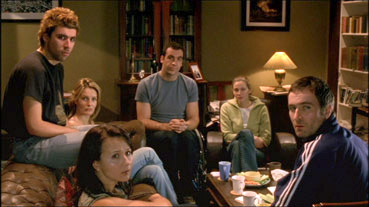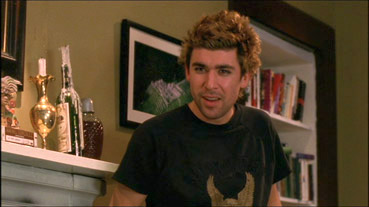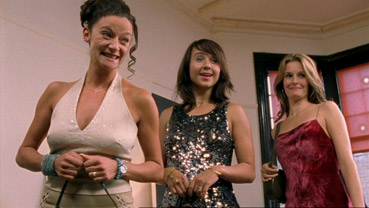|
Channel
4 have managed a nice line in cult comedy series in recent
years, which despite a consistently high quality have not
always found the audience they deserve. Everyone I know
watched Father Ted, a good many of them were into
Black Books and Spaced, but less than half
were even aware of The Book Group. Maybe it hasn't
had time to build up the right word-of-mouth (it is the
most recent of the above mentioned series) or maybe it
lacks that all-important 'hook' that snares an audience,
whether it be the engagingly daft priests in Father Ted,
the Basil Fawlty-like rudeness of Bernard Black, or the identifiably
sympathetic leads and media-aware hipness of Spaced;
all of these programmes had a key element that rapidly became
the signature of the individual series. On top of that,
Father Ted wandered confidently into the realms of
the surreal, Spaced had its post-modernist film referencing
and directoral inventiveness, and Black Books had
a heightened, absurdist sense of unreality. Most of all,
each of the series boasted easily likeable characters – even Bernard Black is rude in a funny way, a manifestation
of a personality trait that almost all of us keep firmly
under control but would love to occasionally let rip.
The
first thing that strikes you about The Book Group is that it has none of these. Not one of the characters
are instantly likeable and a couple are genuinely unpleasant.
There is no surrealism, no post-modernist referencing, no
wildly comedic characterisations or laugh-out-loud gags.
No single character is given more screen time than another
and the direction is decidedly low-key – right from the
start this plays more like drama than comedy. Early laughs
are awkward ones, coming at the expense of characters' sometimes
acute embarrassment. And if that wasn't enough, the entire
first episode takes place in the here and now in a single
location, most of it in one room. So what is it, exactly,
that makes The Book Group so damned good?

The
first response has to be precisely because it is so unlike
its quoted comedy predecessors. Like BBC's The Office,
it is something of an observational work, a comedy of embarrassment
(though I have yet to warm to The Office, which seems
to recycle the same jokes and situations but narratively
go nowhere) and could indeed wear the jacket of comedy-drama
without inviting a visit from the fraud squad. As writer-director
Annie Griffin states on the commentary track, a character
doesn't necessarily have to be likeable to engage our sympathies
and this seems to be the challenge she sets herself – to
create situations in which an audience can warm to characters
that on the surface you'd actually like to slap.
Central
to the narrative (though not in the traditional sense a
main character) is Clare, an American living alone in Glasgow who
has the idea of starting a book group in order to meet like-minded
people. To her surprise and dismay, her advertisement is
answered not by the hoped-for intellectuals, but quiet,
handsome, wheelchair-bound Kenny, football obsessed Rab,
Scottish, Dutch and Swedish football wives Janice, Fist
and Dirka, and good-looking but opinionated young Barney. Only Barney meets her expectations and it is perhaps
appropriate that he is every bit as insufferable as her.
Both are self-obsessed: Clare is wallowing in self-pity
and has a condescending attitude to just about everybody, while Barney is a smugly pretentious posh boy who believes
he is intellectually superior to most of the human race.
Actually connecting with the football wives on any level
is initially tricky, and it is uncertain whether Rab has
ever even read a book, his motives for even attending the
group being at first strangely uncertain. The only really
sympathetic character in the first episode is Kenny, a genuinely
nice guy who still manages to kick against expectations
with his almost vicious reaction to an aggressive come-on
in episode 2, and there's always that nagging concern that
we're sympathising with him because he's the one in the
wheelchair. Despite its restrictive setting, its sometimes wincingly
irritating character details and a lean towards the dramatic,
the first episode somehow grabs through a combination of
intrigue, decent writing, nicely judged performances and
oddball character details. It also ends on one of the best
examples of comedy of embarrassment I've seen in years,
which I won't spoil for the uninitiated.
Having
established the format, the surprise is that in episode
2 the show opens up considerably, showing us the characters
in their work and home environments and expanding on
elements only hinted at in the first show. Episode 3 even
begins with two fantasy sequences, dramatic realisations
of the books Clare and Kenny have begun writing. As the
series progresses, Griffin's aim of making us care for people
we wouldn't want to actually spend time with ourselves is
successfully achieved, in the main because we learn why
the characters behave the way they do. This doesn't always
make them likeable, but they do become more human, oddly
believable and, well, interesting. And by the end
of the series, it's hard not to warm to all of them on some
level. They become like flawed friends, people we like but
wish they would just stop being so... well, you can fill
in your own irritating personal trait here.

Once the attachment is formed we care about them, laugh
with them and sometimes at them. A second viewing can actually
prove even funnier, as familiarity with the characters reveals
just how effective the balance between drama and comedy
actually is and how well both elements work. It's this
that really makes it part company with the aforementioned The Office, most of whose characters never really
become either sympathetic or remotely likeable; the squirm
factor here is actually used to develop narrative, character
and audience identification.
Each
episode is built around a different meeting of the group – whoever selects the book is obliged to host the meeting,
which proves a useful dramatic inroad to that character's
life and their relationships with those around them. In
almost all cases personal relationships are to some degree
in trouble and all of the characters are chasing a need,
and not always an obvious one. Some of these are met, but even
when they are the results are often unexpected. One of
the series' real strengths is its refusal to play narrative
by numbers, in part because the characters themselves avoid
following traditional dramatic or even comedic paths; even
though they do all go through the expected transition almost
demanded by filmic storytelling, they do not necessarily
find the sort of resolution so many movies (and even TV
series) have led us to expect.
Writing
and direction aside, the key to selling this lies in the performances, with all of the relatively unknown actors completely inhabiting
their roles and creating fully rounded characters that are realistic
but with that slightly exaggerated comedic edge. Rory McCann in particular makes for a thoroughly
engaging Kenny, caught between his desires and frustrations,
and trapped between his fantasies and reality. And should anyone
suggest that James Lance is overdoing it as Barney then
I can assure you otherwise – every town and city has a whole
breed of such twerps, and the character's sometimes uncanny
resemblance to the room-clearingly insufferable boyfriend
of a past friend of mine actually convinced me that he was based directly on him.
The
menus are attractively presented, a well-done computer animation
of a book opening to reveal the main options, with selections
prompting a few more pages to fold over to the chosen sub-menu.
The downside is that the commentary track cannot be accessed
while the programme itself is playing, and if you want to
just dip into the commentary it's a bit of a trawl through
the menu system to activate it and return to your chosen
spot, especially as the episodes themselves have no chapter
stops.

An
anamorphic 16:9 transfer that is typical of VCI's work in
this area in many ways, though somehow doesn't seem quite
as obviously dynamic as the same company's excellent job on Black
Books. This could partly be to do with the visual aesthetics
of the series itself, with its emphasis on naturalistic
lighting and settings rather than the more studio look of
Bernard Black's shop. Still a very decent job, with solid
blacks, natural-looking colours and no sign of artefacting
or edge enhancement, and played on an LCD monitor at work
it looked seriously impressive.
The
Dolby 2.0 soundtrack does the job fine, this being a long
way from an action piece with even music kept to a minimum.
Dialogue is key and always comes across clearly. Pleasingly,
there is no laughter track – this is not gag-based comedy
and this would have been completely inappropriate, completely
undermining the dramatic elements of the show.
The
best extra here has to be the Commentary Track by writer-director Annie Griffin. An American who has for
some years been resident in Glasgow, she has a good speaking
voice and plenty to say and her delivery is very nicely
paced. Despite covering all six episodes, quiet spots are
extremely rare, and I for one found Griffin's verbal contribution
almost as fascinating as the episodes she was commenting
on. Much of it is surprising and entertaining: Kenny's nervousness
in episode 1 was in part the result of Rory McCann's utter
terror at acting before a camera for the first time; Griffin's
desire to create in Clare "an obnoxious American,"
despite hailing from the same country, and her irritation
at the way American visitors to Glasgow arrogantly try to
correct locals on their pronunciation; her hilariously deadpan
analysis of a scene in episode 3 which a particularly strong
swear word is repeatedly used – "You just cannot say
'cunt' before 10.00 in Great Britain." A fine commentary.
There
are over 17 minutes of Interviews with cast members. Though there is the inevitable back-slapping
and admiration for colleagues and the script, this is far
more insightful than the usual EPK and supplies some useful
background detail on the characters and some engaging behind-the-scenes
stories, plus the occasional amusing titbit – Saskia Mulder
admitting, for example, with a very telling look, that she loved playing a character who was in love with Kenny.
Some information is repeated from the commentary, but it's
nice to hear the story of Rory McCann's extreme nervousness
from the man himself. Framed at 4:3, the interviews are
mostly well lit and very nicely presented. They also do
not have the usual DV look – whether this is the result
of shooting on film or some careful post-production filtering is uncertain, but the results are very pleasing.
Finally
there is a transcript of a live Internet Chat
conducted with Annie Griffin just after the last episode
of the series had aired for the first time. Though brief,
it's still a useful read, not least for the participant who
felt that the horrible Barney was far and away the most
interesting and emotionally together character in the series.
Now I think I know who that might have been....
As
mentioned before, there are no chapter stops in the episodes
themselves, which is a bit of a pest, but at least tolerable
on a 22 minute programme. Subtitles are English for the
the hard of hearing only.
The
Book Group deserves to be more widely seen. In just
one episode it carves its own unique identity and over the
course of six creates fully rounded, wonderfully performed,
not obviously likeable but still sympathetic characters
and develops them in interesting, not always expected ways,
all the while managing to stay rooted in a reality. I have
yet to catch series 2, and it will be interesting to
see if it goes the way of the second series of Spaced
(every bit as good) or Black Books (loses it completely)
or ends up somewhere in between. On the basis of this fine first
series, I'm hoping for the first.
|